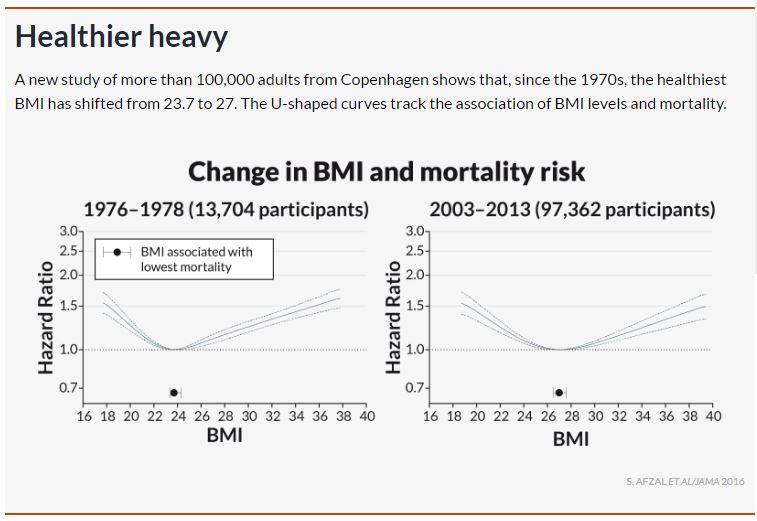For as long as we can remember doctors have warned us of the dangers of becoming overweight and have been treating overweight people as if they were seriously ill and needed to be healed. But this could soon change. According to a research in the Journal of the American Medical Association (JAMA), researchers say that being overweight may lead to a longer life. The findings suggest that people who are overweight (but not obese) may live longer than people with clinically normal body weight.
“We published an article in 2005 that showed, among other things, that overweight was associated with lower mortality – and we got an awful lot of negative feedback from that,” says the current study’s lead author, Katherine Flegal, a senior research scientist at the Centers for Disease Control and Prevention (CDC). Since that study, however, dozens of others have reached the same conclusion – even if it was hard for researchers and the public to accept.
According to an article in The Nutrition Journal by Dr. Linda Bacon and Lucy Aphramor:
“Most epidemiological studies find that people who are overweight or moderately obese live at least as long as normal weight people, and often longer.”
According to Dr. Claudia Kawas, a geriatric neurologist at UC Irvine: “It turns out that the best thing to do as you age is to at least maintain or even gain weight. It’s not good to be skinny when you’re old.”
See Dr. Claudia Kawas comments on 60 minutes below.
Where did the study come from?
The study was published by The Journal of the American Medical Association. The study was carried out by a collaboration of researchers from US universities and the US government-funded National Centers for Disease Control and Prevention.
The comprehensive study confirmed that obese people tend to die earlier than people of normal weight. But it also found that overweight people — those with a body mass index (BMI) of 25 to 30 — had a lower risk of dying than people of normal weight.
Body Mass Index is based on a person’s weight and height. Under the classification system a BMI below 18.5 is regarded as underweight, anything between 18.5 to 24.9 is ‘healthy’, 25 or over is ‘overweight’ and 30 or more is categorized as ‘obese’.
When people are too heavy, they have a much higher risk of heart disease, cancer, stroke, arthritis, diabetes and a range of other ills.
What is BMI?
- BMI (body mass index) is a measure that adults can use to see if they are a healthy weight for their size
- What is a healthy BMI?
For most adults, an ideal BMI is in the 18.5-24.9 range - If your BMI is higher than 25, you weigh more than is ideal for your height
- 25-29.9 is overweight
- 30-39.9 is obese
- 40 or more is very obese

The National Institutes of Health has a BMI calculator online here.
The CDC and WHO both advise keeping weight in the accepted healthy range, meaning under a BMI of 25.
Bottom line is that everyone, no matter their BMI, should make routine trips to the doctor to make sure heart and organs are functioning properly, and cholesterol and other levels are normal, continue to eat healthy and to keep exercising.
Sources:
healthland.time.com
jama.jamanetwork.com
cbsnews.com
NHS Choices
